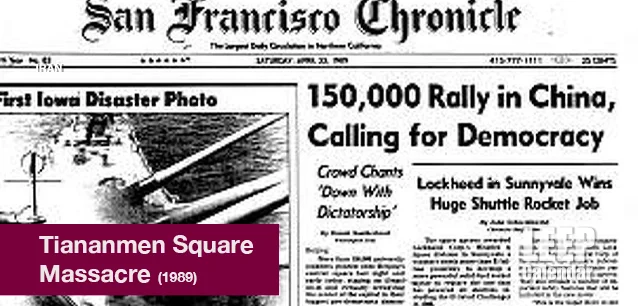 AD
AD
Today is: December 19
Scroll to explore events active on this date.
LEEP INK FEATURES

August? Absolutely!
In August, we live through the Dog Days of Summer. It's hot and often humid, and those who can leave for better climates do. Down south, winter is in full force. August is also known as "the ...

In The Heat of July: July 2025 Events
Is it hot enough (or cold enough if you're below the equator) for you yet? There is actually a day for that! Like every month, I pick a diverse collection of events you may or may not know about. This ...

May Blooms: Events in May 2025
Along with October, May is one of the most densely packed months of the year. It's before the summer humidity and the last whole month of the school year. The weather is warming in t...
About the Tiananmen Square Massacre
Politics , Civil Rights
China Japan & Korea
Ends: Jun 04, 2024
DESCRIPTION:
The Tiananmen Square Massacre, also known as the June 4th Incident, was a significant event in the history of modern China. It took place in 1989, at a time of considerable political and economic reform and social unrest.
Under the leadership of Deng Xiaoping, China was transitioning from Maoist policies towards a more open economy. This period of change led to a rise in expectations and awareness among the population, particularly the students and intellectuals who started to demand more political freedom, democratic reforms, and an end to corruption.
In April 1989, thousands of students initially gathered in Tiananmen Square in Beijing to mourn Hu Yaobang's death, a liberal reformist purged from the Communist Party. The gathering quickly became a significant pro-democracy movement, with protestors demanding greater political transparency, freedom of speech, and other democratic rights.
The Chinese government declared martial law, and on June 3-4, 1989, the Chinese military was deployed to disperse the protestors. The troops forcefully cleared the square using rifles and tanks, resulting in hundreds of deaths. The Chinese government's official death toll was 200, but estimates from other sources vary from several hundred to potentially several thousand.
The event had profound impacts on Chinese society. It led to a clampdown on political dissent and temporarily halted the economic reforms. Internationally, the Chinese government faced widespread condemnation, leading to sanctions from several countries.
The Tiananmen Square Massacre is a heavily censored topic in today's China. The Chinese government strictly controls information about the event. Public discussions, commemorations, or criticisms of the incident are generally prohibited. Many younger Chinese citizens do not know of the event due to the government's efforts to erase it from the public consciousness and history books.
However, the memory of the event survives among some groups and individuals who privately acknowledge and commemorate the incident. Abroad, Chinese dissidents and human rights organizations keep the memory alive by marking the anniversary and calling for a re-evaluation of the event.
The Chinese government's handling of the Tiananmen Square Massacre remains contentious in its relations with Western democracies. It is often wielded as an example of the Chinese Communist Party's intolerance towards dissent and its control over information. The Chinese government maintains that its actions at Tiananmen Square were necessary for maintaining social stability and the continued economic progress of the country.
VIDEOS
SUPPORTING DOCUMENTS
Currently, this event does not have supporting documents.
ADDITIONAL IMAGES
Currently, this event does not have supporting images.
Where would you like to go now?
 AD
AD


/footer-logo.svg)
